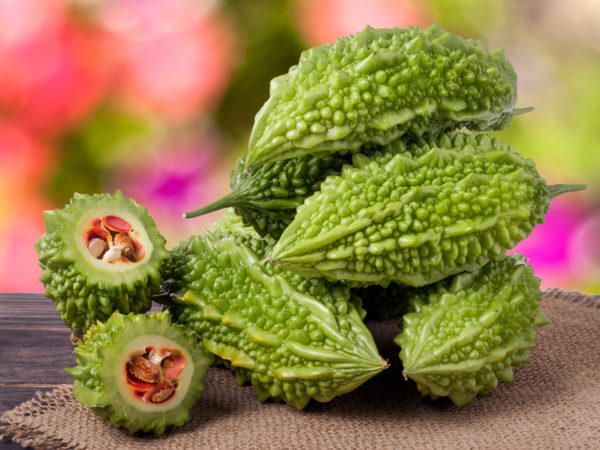Bitter Melon: A Bitter Route To Long Life?
What is your opinion of bitter melon, the herb Momordica? Does it work to curb sugar cravings?
Andrew Weil, M.D. | May 30, 2014

Originally published August 1, 2002. Updated May 30, 2014.
Momordica charantia, also known as bitter melon or bitter gourd, is a climbing vine native to Africa, Asia and Australia that is now cultivated in warm areas all over the world. Bitter melon can help regulate blood sugar. It may also reduce sugar cravings, but research is needed to establish that.
Interestingly, bitter melon is one of the primary herbs taken to promote health in the Okinawan diet, notable because the older people on Okinawa appear to be the healthiest elderly population in the world. The island has the highest percentage of centenarians anywhere, the longest disability-free life expectancy, and a very low rate of heart disease. Of course, bitter melon isn’t the only contributor to Okinawan health and longevity – diet and other aspects of the island lifestyle play major roles.
Because bitter melon contains a chemical that acts much like insulin to lower blood sugar, it has been studied as a treatment for diabetes. However, a 2012 review of four randomized controlled trials found “no statistically significant difference” in blood sugar control with bitter melon compared to placebo. In addition, no studies have established a safe and effective dose of bitter melon that would serve as a reliable treatment for diabetes. In one trial, five grams (about two teaspoons) of powdered bitter melon daily reduced blood sugar by 54 per cent; in another, about a quarter-cup of the extract reduced blood sugar by 20 percent. If you’re taking prescription drugs to lower blood sugar, be sure to tell your physician if you’re thinking of trying bitter melon.
Bitter melon has also been studied as a treatment for AIDS and some types of cancer, although so far there have been no human studies. As far as HIV is concerned, some research suggests that a component of bitter melon may prevent the virus from infecting human cells, and laboratory studies indicate that one component of the herb may help slow the growth of some cancers. However, at this writing there is not enough evidence to show that bitter melon is an effective treatment for either health concern.
Bitter melon has also been recommended for a variety of other conditions including glaucoma, hemorrhoids, high cholesterol, infertility, psoriasis and stomach cramps, but here, too, I’ve seen no evidence of its effectiveness for treating any of these problems.
In some studies, people taking bitter melon developed headaches. Adverse effects (including headache, fever and stomach pain) were most common among people with glucose-6-phosphate deficiency – an inherited disorder most common among those of Mediterranean or Middle Eastern backgrounds. Expectant mothers should not take bitter melon until we know more about its possible effects in pregnancy.
Bottom line: Bitter melon appears to be a healthful addition to the diet, although more research is needed. Buy some at your local Asian-themed market, or grow it yourself (seeds are readily available on the Internet) and see if its unique flavor appeals to you.
Andrew Weil, M.D.
Sources:
C.P. Ooi et al, “Momordica charantia for type 2 diabetes mellitus,” Cochrane Database Systematic Review, August 2010 doi: 10.1002/14651858.CD007845.pub3.












